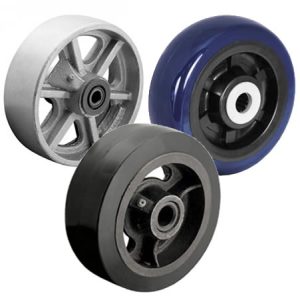
Industrial wheels play an important role in many material handling applications. They are commonly used on hand trucks, carts and mobile shelving units. With industrial wheels, you can push objects such as these to easily move materials. There are different types of industrial wheels, however. If you’re planning to buy them for your business, there are several things you should consider.
#1) Bearing Type
You should consider the bearing type when choosing industrial wheels. Bearings are components that connect wheels to axles. Some industrial wheels feature a plain bearing, whereas others feature a roller bearing. Plain bearings are simple, inexpensive and require little or no maintenance. Roller bearings, on the other hand, consist of metal rollers in a case.
#2) Wheel Material
Don’t forget to consider the wheel material. Industrial wheels are available in different materials. You can find them in metals and alloys, and you can find industrial wheels in various and synthetic materials.
Common materials in which industrial wheels are made include the following:
- Cast iron
- Drop-forged steel
- Ductile iron
- Nylon
- Phenolic
- Poly/Aluminum
- Poly/Cast iron
- Rubber
- Rubber/Aluminum
- Rubber/Cast iron
#3) Wheel Diameter
Industrial wheels are also available in different sizes. The diameter of an industrial wheel, of course, will affect the ease at which it’s rolled. Generally speaking, larger industrial wheels require less force to roll than their smaller counterparts. If you’re planning to install them on the bottom of an object — and you intend to push the object — you may want to choose industrial wheels with a relatively large wheel diameter.
#4) Load Rating
You can’t ignore the load rating when choosing industrial wheels. As you may know, this is the maximum amount of weight for which an industrial wheel has been rated to support. Some of the smaller industrial wheels have a load rating of 300 or 400 pounds, whereas larger and heavier duty industrial wheels have a load rating of 2,000 or even 4,000 pounds.
It’s important to note that load ratings are “per industrial wheel.” If you install four industrial wheels on the bottom of an object, you can multiply the wheels’ load rating by four to determine the maximum amount of weight they can support.
#5) Tread Width
Finally, you should consider the tread width when choosing industrial wheels. Because they are used in work-related applications, industrial wheels are often designed with tread. Tread width refers to the width of an industrial wheel’s tread. Along with wheel diameter, you can use this metric to gauge the overall size of an industrial wheel.
